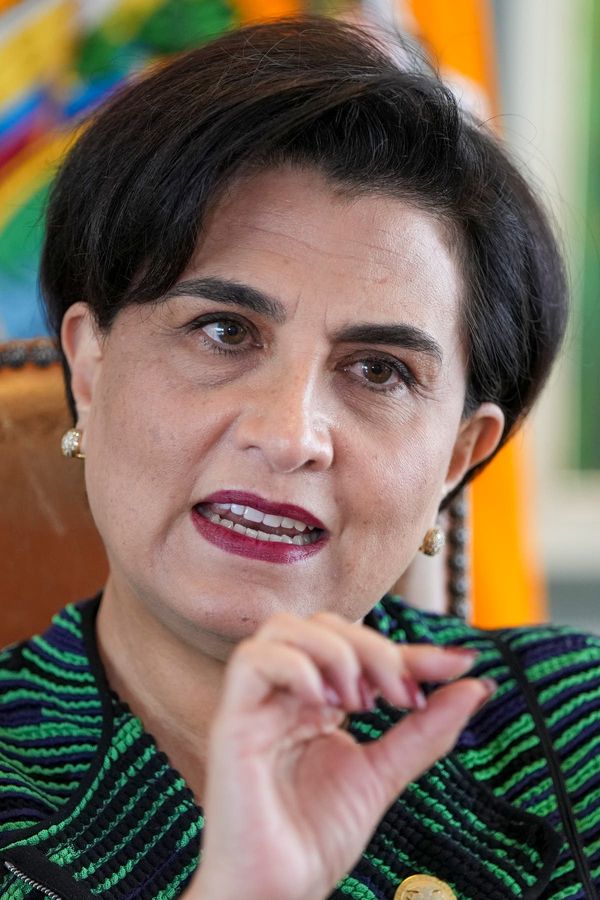The question...
What time is it?
Talking Points

- Evacuations began in the scarred city of Sumy in northeastern Ukraine
- Europe cut Russia from a mission to land a rover on Mars
- France considered Corsican autonomy after violent street protests
- Britain's highest court denied Julian Assange an extradition appeal
- Nazanin Zaghari-Ratcliffe freed after UK-Iran talks breakthrough
- A report argued up to one-third of disabled children face abuse
- China locked down tens of millions in latest Covid scare
- The FBI alleged that Malaysian banker Jho Low stole $1.4bn
- Karnataka's top court upheld a ban on hijabs in schools
- Christchurch remembered the Australian far-right mosque attack
Dive deeper

This week Volodymyr Zelenskyy appealed directly to the US Congress for a no-fly zone. What he got instead was a standing ovation, several thousand anti-tank missiles, and a Bono poem read by Nancy Pelosi. While Ukraine fends for itself, a new world order emerges.
Casualties the first mistruth of war
A noose is being fitted around Kyiv, but not without great difficulty. While Ukraine's capital has largely avoided indiscriminate shelling, the same cannot be said for the satellite cities of Bucha and Irpin just a short drive to the northwest. Bucha lies in ruins and its opposite in Irpin has been drained of civilian life . Late in the week the Ukrainian army repelled several attempts to ford the Irpin River with pontoon bridges. Such defensive engagements and counterattacks are, we are told , responsible for inflicting the loss of 7,000 Russian lives (not to mention some 10% of its armour). Given that most of the foreign correspondents in Kyiv have displayed a studied ignorance of Ukraine's own losses, there is not much point discussing casualties. Both sides have an interest in deflating their own while inflating the other's, but it's quite striking how unreliable the picture we are receiving is.
And yet — a profound yet at that — for all those counterpunches the Russian drive to bisect the country is taking shape. The stout defence at Kharkiv, which has bled aggressor and defender, encouraged a shift in Russian tactics: shell it and move on. A westward thrust from Luhansk has linked up with the bogged down offensive outside Ukraine's second city and are now reaching south to Dnipro. At the same time, and with far more success, Russian columns are flying through Zaporizhia Oblast on their way north. The bulk of Ukraine's army under the Joint Forces Operation remains deployed in what's left of Donetsk and Luhansk Oblasts. If everything east of the Dnieper River is encircled, the Ukrainian military will have been dealt a stunning blow.
Further south, a desperate situation is turning hopeless in Mariupol . According to the mayor some 80% of the city's buildings have been rendered uninhabitable by constant shelling. In one galling episode a theatre designated as a refuge for women and children was directly struck.
Do you take Yuan?
While the Russian Federation puts the final nails in the coffin of a unipolar geopolitical world, some very interesting moves are happening at the margins. And, quelle surprise, it's all about oil. After the craziness of the last fortnight (a 50% surge in crude prices) the market has simmered back down to around $100 a barrel. But, the fuel must flow, and so the vast machinery of American petro-chemical diplomacy coughed and sputtered into action. First, to Venezuela, which was very recently Public Enemy #1 within the Beltway. Last week a high-level delegation landed in Caracas to extend the beneficent hand of Washington’s soft power. Why? Well, Nicolas Maduro’s redemption arc (a two-week speedrun from madman to partner) may have something to do with the fact that Venezuela is one of the few countries with the spare capacity to pump more crude and bring down global prices. What else is foreign policy but having a wide broom, a large carpet, and a short memory? But all was not quiet on the Middle Eastern front. Saudi Arabia and the United Arab Emirates — usually the chummiest of chums — told the Americans to stick it. Riyadh is shedding its history of a US client state and stepping into the new multipolar world. The Saudis went a step further and made noise about selling oil to the Chinese (not news) in yuan instead of dollars (big news). If this path is trodden, and others follow along it, then we will be living through the most meaningful shift in foreign exchanges in living memory. American power doesn't rely on the primacy of the greenback: it is the greenback.
Worldlywise

Violence behind the veil
Mass civilian casualties, extreme food shortages, and no end in sight to a protracted conflict. Nowhere is this worse than in Ethiopia's blockaded Tigray region, according to World Health Organisation boss Tedros Adhanom Ghebreyesus. The figures are stark. Six million people “sealed off from the outside world” for 500 days without access to basic amenities, food, and medicine. What can be gleaned from the few international charities remaining is devastating: 40% of the region faces famine .
Unlike the live-streamed destruction in Ukraine, the Tigray War can't be found on social media. Addis Ababa implemented a full media blackout months ago and heavy fighting has deterred foreign media. Which isn’t to say the conflict is not being documented. But with no ability to gauge the true level of carnage taking place, even the language of mediators and diplomats has taken on a fatalistic edge. Jeffrey Feltman, US special envoy to the Horn of Africa warned that escalation would make Syria "look like child’s play”, and Cameron Hudson from the Atlantic Council’s Africa Center lamented, “at some point we might need a mediator for the mediators."
It is beholden on Ethiopia's Nobel Peace laureate prime minister to allow aid to flow into Tigray. Having leaned heavily on Turkish drones to reverse his flagging battlefield fortunes, Abiy Ahmed is exacting vengeance . As starvation is used as a tool of sectarian war , the likelihood of a unified Ethiopian state recedes from the realm of possibility.

Firmness, commodity, and delight
This week Diébédo Francis Kéré was selected as the 2021 Pritzker Architecture Award laureate. The 51-year-old Burkinabè who now resides in Berlin, said "first of all I am happy and overwhelmed, but the prize also brings a great sense of responsibility." Kéré's entire career has been spent enriching West African public life with schools, medical facilities, and government buildings. His works appear in Togo, not Frankfurt. His nominated work was the 2010 Centre for Earth Architecture in Mopti, Mali, which contains the hallmarks of his oeuvre: buildings that are made from local materials and labour, respond to the climate, and use passive cooling.
Tom Pritzker, chair of the Hyatt Foundation (which funds the prize) intimated that Kéré serves "countless citizens in a region of the world that is at times forgotten." Forgotten by billionaire heirs and architecture committees, perhaps, but not by its 400 million inhabitants.
Over its 43 year history the Pritzker has been awarded almost uniformly to a certain type of practitioner. A smattering of East Asian — and, even more rarely female — faces are are the only clues that the profession is not the sole preserve of American and European men. Museums, galleries, churches and cathedrals of various Christian denominations have baited the judging panel for decades. This year marked two departures for the Pritzker: away from both the borderline monoculture of winners and infatuation of expensive monoliths.
Kéré addressed this, "I don't want to talk about racism directly but this is a field where you need a lot of resources. You really need to be strong and be lucky, as competitions are not always so open . I hope that young people in Africa will see me and know that this is a possible path for them too." Fittingly measured words.
The best of times

The city of (green) dreams
India's financial capital Mumbai is the first South Asian city to buttress its net-zero ambitions with a plan to get there. It will require a total overhaul of infrastructure, transport, and energy for a population of 19m that include both the stupendously wealthy and the impoverished. Maharashtra Environment Minister Aaditya Thackeray put it simply, "We don't have the luxury of time". Flooding in the coastal metropolis worsens every year.
We've found Atlantis
Contrary to popular belief, it's in Yorkshire .
The worst of times

The 'living prop'
This week a 2008 report from the Central Intelligence Agency's own inspector general was declassified. It describes how one post-9/11 detainee, Ammar al-Baluchi, was used as a "living prop" in a CIA black site to train torturers how to bounce detainees off walls. It happened with such vigour and regularity that al-Baluchi developed significant brain damage . After two decades in Guantanamo Bay he is still awaiting trial: his torturers have retired to the leafy suburbs of Virginia and Maryland.
Google's relocation policy
Ariel Koren, a Jewish American Google employee, has spectacularly accused her employer of trying to force her out of the country for criticising a cloud-computing project in Israel. She was one of 1,000 staff who signed a letter asking their company to withdraw from a program that could be used for illegal surveillance but only one of two who went public. She was given just 17 days to pick up and move to São Paulo or lose her job.
Weekend Reading
The image

Happy Holi to all those who celebrate. Photo supplied by The Telegraph .
The quote
"In the classical theory, the horizon acts as a perfect one-way membrane which does not let anything out and the exterior is therefore the same for all black holes of a given mass. This is the classical no-hair theorem. However, in quantum theory, the state of the matter that collapses and forms the black hole continues to affect the state of the exterior, albeit in a way that is compatible with present experimental bounds. This is what is known as 'quantum hair'".
– Professor Xavier Calmet (a real-life Professor X) from the University of Sussex explains how Stephen Hawking's black hole paradox may have been unravelled. We think...
The numbers
$1,300,000,000
- The United Nations has raised $1.3bn to alleviate extreme hunger in Yemen: just one-third of its target . It is now virtually inescapable that 161,000 Yemenis will face famine later in the year.
621,000 new infections
- South Korea copped a record swell of coronavirus cases this week. It doesn't matter how strict your health orders are: it's only a matter of time. See also: China.
The headline
"Tuberculosis Got to South America Through... Seals?" — The Atlantic . That's how we got it!
The special mention
Vale, William Hurt. If Gorky Park isn't a movie for this moment, nothing is.
A few choice long-reads
- From Salon an engrossing three-part investigation into the dark machinations behind the decline of the US public school systems: A tiny college goes to war with public schools.
The answer...
Daylight Savings Time . Forever. This week the US Senate voted to, pending House approval, vanquish the dark once and for all. Our quest to overcome the laws of the universe continues. Or, at least reshuffle them to render our psychological mise-en-scene slightly more bearable.







